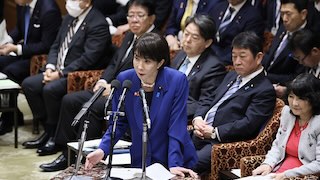TOKYO, Apr 21 (News On Japan) - As former U.S. President Donald Trump’s trade policies—particularly tariffs—once again become a topic of global attention, Japanese citizens are voicing a wide range of opinions.
From concern about economic fallout to frustration over perceived American isolationism, the public mood in Japan reveals deep unease about the impact of Trump-style politics on international relations and Japan’s economic future.
“I think Japan needs to study more,” said one respondent. “Especially in business. We have to understand that if we impose tariffs, the other side will respond. It’s going to lead to chaos.”
Many fear the United States is heading toward greater isolation. “If America loses too many allies, I don’t think it can stand alone—not in today’s world,” said another. While some expressed hope that Trump's decisiveness could lead to positive change, others were skeptical. “He moves fast and makes big decisions. That can be good, but also dangerous. His actions lack diplomacy.”
Several respondents labeled Trump's behavior as erratic and even dangerous. “Of all the presidents I’ve seen, he’s the most extreme. It’s beyond aggressive—almost reckless. In the past, this kind of attitude would have led to war.”
Others pointed to economic concerns. “The global stock markets are unstable, and it’s affecting ordinary people. I’ve already lost about two million yen,” said one investor. “I worry about both the Japanese and American economies. These tariffs are being used as threats, and that’s not sustainable.”
Despite the criticism, there were nuanced views as well. Some acknowledged the logic behind Trump’s efforts to bring manufacturing back to the U.S. from China. “I get his intention, but the method is too harsh. Diplomacy should come first. Tariffs shouldn’t be used to bully other countries.”
A recurring theme was skepticism over whether the U.S. could revive domestic manufacturing to the level Trump envisions. “American workers aren’t as meticulous as Japanese workers,” said one respondent, particularly in reference to the precision required for semiconductors and advanced machinery.
Cultural differences also emerged. “In Japan, we value preparation and subtle coordination—what we call nemawashi,” one person explained. “Trump doesn’t do that. His approach is all pressure and no groundwork.”
While some admired Trump’s energy, others felt his rhetoric had lost credibility. “He says one thing today and something else tomorrow. Maybe it’s a negotiation tactic, but it comes off as unreliable.”
Still, a few expressed support for Trump’s intentions. “He’s trying hard, and I respect that. But he needs to think globally, not just about America.”
Messages to American voters varied. “Please think carefully before voting again,” said one. Another added, “Don’t hate Japan. We want to maintain a good relationship with America.”
One woman was blunt when asked if she’d date someone like Trump in his 30s. “No way. Too selfish. Though he’s handsome,” she laughed.
Overall, most called for peaceful, cooperative solutions. “Don’t push your own opinions too forcefully,” said one. “Use dialogue. Don’t escalate things unnecessarily. The world only works if we work together.”
As Trump considers a return to political prominence, voices from Japan are clear: the stakes are high, the world is watching, and actions taken by one leader can ripple far beyond one nation's borders.
Source: Interviewing Japan















